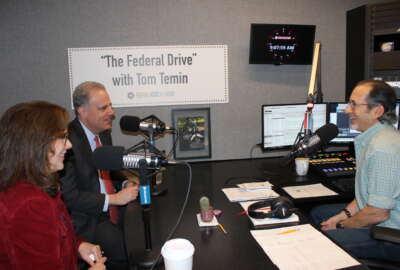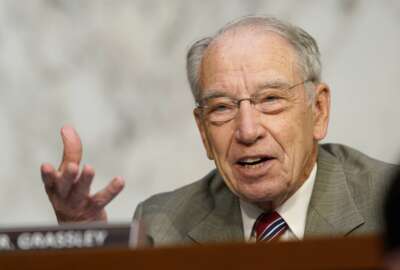Hubbard Radio Washington DC, LLC. All rights reserved. This website is not intended for users located within the European Economic Area.
On Air: Federal News Network
Trending:
Pelberg creates supportive environment to help IRS staff succeed
Top Leaders in Federal Service award winner Marcia Pelberg considers herself a "servant leader" rather than a general. She's been praised for creating an enviro...
wfedstaff | April 17, 2015 4:43 pm
Of the five individuals named as Top Leaders in Federal Service by Federal News Radio, Marcia Pelberg is the only one who could be considered a “leadership leader.”
As the director of leadership and cross-functional programs at the Internal Revenue Service office in Philadelphia, she oversees the IRS’ leadership development program — promoting and supporting continuous learning for the agency’s advancing leaders. 
Asked about her own leadership philosophy, Pelberg describes herself as someone who helps others achieve their goals.
“I guess I would be more of a servant leader than a general, if you will,” she said. “My job is really to help my employees do the best job that they can and to help my customers. By helping others to do their jobs well, they ultimately do support the organization, which, without sounding too ‘Pollyanna-ish,’ our job actually does support the taxpayer. Good leadership, good products, actually are developed with the goal of aiding the taxpayer.”
In her Top Leader nomination, Dr. Susan Clayton, a human resource specialist with the IRS, called Pelberg a great leader because she created an environment that enables her staff to be successful.
“Not only is she extremely competent, Marcia is a model of collaboration, willingness to experiment and push new ideas, break down silos and integrate diverse areas,” Clayton wrote. Marcia demonstrates values-driven leadership, ensuring fairness, equitable treatment and a climate of respect and integrity. She makes a genuine effort to get to know her people and for them to get to know her.”
Clayton added that staff members always know Pelberg “has our back.”
What qualities do you admire in a good leader?
Pelberg: Being authentic, approachable and honest (even if it means telling folks you cannot tell them something or don’t have the answers at this time or giving them less than positive feedback).
Know the individuals on the team so you understand their goals, needs and interests.
- Support your team and create a collaborative environment. Respect others and recognize that everyone brings something to the party.
- Set an example – know the work and be able to explain complex issues so that the team understands what the goal is and how to achieve it. Model the behaviors you want your team to demonstrate.
- Make decisions based on facts or determine the next steps even if there is ambiguity.
What is your leadership philosophy?
Pelberg: Know the organizational goals and help others with how to get there. Help others to achieve their goals.
Who inspired you as a leader when you were younger?
Pelberg: My management career began 28 years ago. There were not many female leaders around in my workplace at the time, but I was fortunate to have several mentors and managers who gave me good feedback and tough assignments, like start up projects and reorganizations, that built my leadership competencies and collaboration skills.
Who do you admire as a good leader now? Why?
Pelberg: There are many examples of great leadership in my organization, but what impresses me most are the leaders who not only see the value of identifying talent, but practice what they preach. They seek out emerging leaders and provide developmental opportunities; they make it a point to meet and get to know current and future leaders. These exemplary leaders instruct our courses and visit classrooms to speak and meet our new leaders. They participate in talent boards and ranking and interview panels, and advocate for and protect funding for activities that develop our leaders at every level. And they coach and mentor others; this is critically important these days. They focus on being able to “tell the story.” In other words, they use their story telling skills to inspire employees and other leaders, influence others including our stakeholders, and create engagement.
What advice would you give to someone who wants to improve their leadership skills?
Pelberg: Two things:
- Individual contributions may have been very important in life before being a leader, but leaders have a different role. Leaders need to change the focus on their successes in completing individual tasks and instead focus on building and working collaboratively, as part of a team (with their own team, with their peers, with their customers). This doesn’t mean losing technical expertise — knowledge of the work is still important as a leader. What it means is learning how to leverage the strengths of the team when meeting goals, completing assignments and sharing recognition.
- Secondly, there is a lot of value in feedback. I encourage that individual to get a clear picture of what others may think of him or her and determine how to develop in areas rated lower than expected. Today’s 360 instruments and debriefs provide good insights. Also, working with a mentor and/or coach is invaluable to looking at behaviors, competencies and actions from a different perspective. The manager is another source of feedback directly related to the individual’s work performance as well as the individual’s development goals.
What’s the most challenging part of being a leader?
Pelberg: A big struggle has always been to balance the pressure of getting the work done and making time to coach/mentor, recognize performance of others, and engage the workforce. Much has been written recently of the fiscal challenges that federal employees face, so continuing to build engagement and encourage our teams to see the value of the work we do is more important than ever.
What is the most rewarding part of being a leader?
Pelberg: To me, when I hear from or about a person with whom I used to work and learn how well they are doing, it is an incredible lift to my day. Sometimes, folks will remind me of something I said or did that influenced their accomplishment or gave them insight or direction or peace of mind. I am coming close to retirement, so much of my focus nowadays is on leaving a legacy. I hope that my coaching and mentoring makes an impact on individuals doing the best job they can and taking responsibility for their own continual learning. I hope the leadership, readiness, engagement/community building and succession planning programs under my watch continue to grow and evolve to meet our customers’ needs and interests. After all, the work we do supports our organization which in turn supports the taxpayer.
More From the Special Report: Top Leaders in Federal Service:
Online Chat: Ask the Leadership Expert
Low morale? You’re not alone, new federal survey shows
When the going gets tough, good leaders lead
Making a difference … the right way
GSA’s Godwin sees employees as her ‘greatest resource’
Parker leads IRS Chief Counsel’s legal processing staff to success
Pelberg creates supportive environment to help IRS staff succeed
CDC’s Rothwell epitomizes ‘top shelf’ leadership
Four generations of public service help Williams succeed at Energy
Top Leaders in Federal Service — Nominee List
Copyright © 2024 Federal News Network. All rights reserved. This website is not intended for users located within the European Economic Area.
Michael O'Connell
Michael O’Connell is senior digital editor of Federal News Network optimizing content for the best user experience. Follow @moconnellWFED
Follow @moconnellWFED
Related Topics





